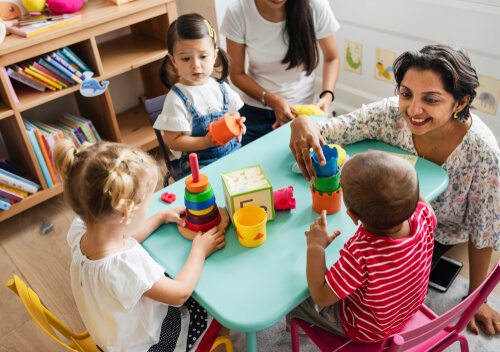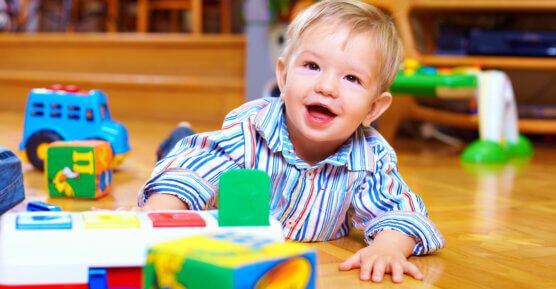
Childcare providers including nurseries are legally required to adhere to childcare standards in England to ensure high quality childcare is being delivered. England has a statutory framework that sets the standards that all providers must meet to ensure that children learn and develop well.
Here is a summary of England’s minimum quality standards and regulations for early years learning and childcare.
What are the childcare standards in England?
In England, the Early Years Foundation Stage (EYFS) statutory framework sets the standards that childcare providers must follow for learning, development, health and safety.
The EYFS framework seeks to provide quality and consistency, equality of opportunity and a secure foundation for all children, in all early years settings.
Learning and development requirements
The seven areas of learning and development must shape educational programmes in early years settings. The ‘prime areas’ are:
- Communication and language
- Physical development
- Personal, social and emotional development.
Providers must also support children in the following four ‘specific areas’ and apply the three ‘prime areas’ though these:
- Literacy
- Mathematics
- Understanding the world
- Expressive arts and design
You can read more about EYFS and the seven areas of learning.
Practitioners must consider each child’s individual needs, interests and development. They must use this information to plan challenging and enjoyable experiences in all areas of learning and development. They must ensure that children learn in a way that is suitable for them.
If a child’s progression in any ‘prime area’ gives cause for concern, practitioners must discuss this with the child’s parents/guardians and agree how to support the child. They must consider whether a child may have Special Educational Needs and Disabilities (SEND).
Childcare providers do not need to prescribe a particular teaching approach, e.g. Montessori, however practitioners must stimulate children’s interests. They must respond to each child’s emerging needs and guide their development through warm, positive interactions coupled with secure routines for play and learning.
Each child must be assigned a key person to ensure that every child’s care is tailored to meet their individual needs. They must seek to engage and support parents and guardians in guiding their child’s development at home.
Ongoing assessments must be made of children’s progress and their parents/guardians must be kept up to date. Practitioners must review the progress of children aged between two and three against the early learning goals and develop a targeted plan if necessary.
Safeguarding and welfare
Providers must take all necessary steps to keep children safe and well. This includes having and implement a policy and procedures to safeguard children.
All staff must be trained to understand the safeguarding policy and to be able to identify signs of possible abuse and neglect, and respond in a timely and appropriate way. Any allegations must be reported to England’s education regulator Ofsted.
Registered providers (other than childminders and childcare on domestic premises) must obtain an enhanced criminal records check for every person aged 16 and over who works directly with children, lives on the premises or works on the premises.
Staff qualifications
Staff must have appropriate qualifications, training, skills knowledge and a clear understanding of their role and responsibilities. Providers must support staff in their professional development to ensure they offer quality learning and development experiences for children.
The manager of a setting registered with Ofsted must hold an approved level 3 qualification or above and have at least two years’ experience in working in an early years setting, or other suitable experience. At least half of all other staff must hold at least an approved level 2 qualification.
At least one person with a current paediatric first aid (PFA) certificate must be on the premises at all times. The certificate must be renewed every three years.
Childcare staff ratios
- For children aged under two, there must be at least one member of staff for every three children
- For children aged two, there must be at least one member of staff for every four children
- For children aged three and over, there must be at least one member of staff for every eight or 13 children, depending on the qualification level of staff.
In independent schools (including nursery classes in free schools and academies) where the majority of a class will reach the age of five or older within the school year, there must be at least one member of staff for every 30 children, depending on qualification level of staff.
Food and drink
Providers must serve children meals, snacks and drinks that are healthy, balanced and nutritious. They must also obtain information about any special dietary requirements, preferences and allergies.
Staff involved in preparing food must be trained in food hygiene.
Premises and equipment
A childcare provider’s premises must be fit for purpose and suitable for the age of children cared for. Premises and equipment must be organised to meet the needs of children.
Where indoor activities are integral to the provision, the following space requirements apply:
- Children under two years: 3.5 m2 per child
- Two-year-olds: 2.5 m2 per child
- Children aged three to five years: 2.3 m2 per child
Children must have access to an outdoor play area. If there is no outdoor area at the premises, outdoor activities must be planned and taken on a daily basis wherever possible.
Special Educational Needs and Disabilities
All providers must have arrangement in place to support children with SEND. Providers who offer group provision, such as day nurseries, must identify a member of staff to act as a Special Educational Needs Co-ordinator. To read more about how nurseries support children with SEND.
Who regulates and inspects nurseries in England?
The Office for Standards in Education, Children’s Services and Skills (Ofsted) regulates and inspects early years providers in England.
This independent organisation provides a quality assurance system through its inspections and reports.
Ofsted works to ensure each child is given the support and guidance they need to develop and are kept safe, secure and happy during their early years.
The regulatory body’s inspections are based on national standards and regulations and aim to ensure childcare providers uphold these standards and that they provide quality childcare and early learning.
Complaints procedures
All childcare providers must have a written procedure for dealing with concerns and complaints from parents and guardians. They must keep a record of any complaints and their outcome.
Complaints must be investigated relating to their fulfilment of the EYFS requirements and give notification to the outcome within 28 days of receiving the complaint.
Quality assurance
When providers become aware they will be inspected by Ofsted, they must notify parents and guardians. An inspection is where the provider’s services are assessed and rated.
Ofsted measures each provider on their overall quality and standards of early years provision based on four key quality areas:
- Effectiveness of leadership and management
- Quality of teaching, learning and assessment
- Personal development, behaviour and welfare
- Outcomes for children
Providers must make their inspection report available to parents/guardians of children who attend regularly.
Always check nursery inspection reports
When looking for a nursery for your child, it is vital to check inspection reports to ensure the provider meets the legal requirements and standards set out in the EYFS, the minimum standards in childcare in England, and the guidance of your local authority.
You can also read more tips on how to find a nursery and questions to ask.


